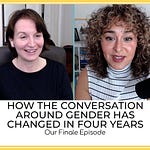Dr. Michael Bailey is an American psychologist, behavioral geneticist, and professor at Northwestern University best known for his work on the etiology, or origins, of sexual orientation. He maintains that sexual orientation is heavily influenced by biology and male homosexuality is most likely inborn. Dr. Bailey’s 2003 book, The Man Who Would Be Queen, gave an accessible, intimate, and compassionate account of male sexuality, with a focus on gender-nonconforming boys, gay men, and male-to-female transsexuals. The book was nominated for an award, which was later retracted, from the Lambda Literary Foundation, an organization that promotes gay literature. Aside from legitimate critiques of the book and Dr. Bailey’s theories, attacks spilled into the realm of the egregious as a small group of radical transwomen viciously went after Mike, his reputation, and his family. All of this was documented thoroughly in Alice Dreger’s book, Galileo’s Middle finger, which ultimately exonerated Dr. Bailey of the accusations against him.
Today, Mike explains how he got interested in working with sexuality during a time when it was quite taboo in academia. After publishing research on male sexuality, Mike began encountering transexual women who wanted to talk about their experiences. He came to recognize that some MtF transsexuals were nothing like what he’d expected. He went on to study this further, write his book, and soon after, all hell broke loose. While Mike is certainly no contrarian, he unapologetically tells the truth and has committed himself to do his job well as a psychological researcher.
Links:
Download The Man Who Would Be Queen:
Researchgate.net/publication/281747420_The_Man_Who_Would_Be_Queen
Christine Benevunuto: Sex Changes: A Memoir of Marriage, Gender, and Moving On Amazon.com/gp/product/B0085UCVKY/ref=dbs_a_def_rwt_hsch_vapi_tkin_p1_i0
Alice Dreger (June 2008). “The controversy surrounding The Man Who Would Be Queen: a case history of the politics of science, identity, and sex in the Internet age”. Archives of Sexual Behavior. 37 (3): 366–421. doi:10.1007/s10508-007-9301-1.
Ray Blanchard (1989). “The classification and labeling of nonhomosexual gender dysphorias”. Archives of Sexual Behavior. 18 (4): 315–334. doi:10.1007/bf01541951. PMID 2673136. S2CID 43151898.
Extended Notes
A little bit about Michael and how he got into this field of work.
Back then, there was stigma that if you were researching about gay or queer topics, you were also gay/queer.
Gender non-conforming children tend to be correlated to having same-sex sexual orientation later on in life.
However, where do transgender people fall in between all of this? Michael shares the first time he spoke with a transgendered woman.
There are different types of transgendered people, and reasons why they transition, and you really can’t group these two together in studies.
Since then, Michael has met more people who have autogynephilia.
What kind of feedback has Michael received since conducting, and publishing, his research?
Michael talks about his book, The Man Who Would Be Queen.
Michael’s book gained a lot of negative press and people petitioned to have it removed.
Why did so many people react so negatively to Michael’s book?
How does someone become an autogynephile?
Quotes:
“I knew I had learned something fundamental [about the trans community]. Even among academics at sex conferences, autogynephilia was not known.” — Michael [23:10]
“The autogynephiles who put their families through this are not a representative group of autogynephiles. We are seeing a combination of autogynephilia and narcissism.” — Michael [51:30]
“I believe there is a strong genetic component in autogynephilia cases.” — Michael [58:40]
This podcast is partially sponsored by ReIME, Rethink Identity Medicine Ethics:
Learn more about our show: Linktr.ee/WiderLensPod











